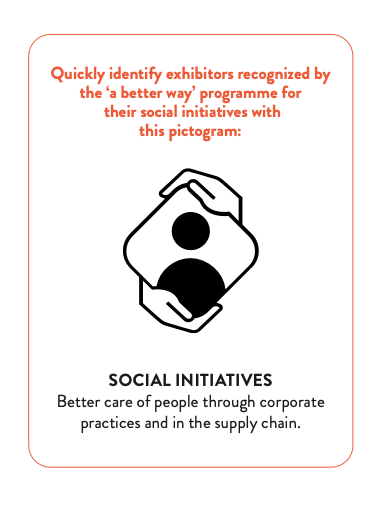‘a better way’ programme criteria #1: Social initiatives The - Première Vision Paris
For nearly 50 years Première Vision has served as the central hub of the upstream fashion industry, a catalyst fostering connections, exchanges, and discoveries. With the introduction of its innovative “a better way” programme, the show is committing to driving the sector’s transformation by sharing key analyses of the environmental and social performance of its exhibitors.
The program is based on 5 criteria: Social initiatives, Impact of production sites, Traceability, Composition, and Product life cycle and end-of-life. Five questions are used to assess how robustly each of these key areas is managed.
Here, a look at the issues covered by Social Initiatives.
1. Social risk analysis
Risk assessment is a crucial first step in the prevention of health and safety hazards in a company’s own operations and those of its subcontractors. This reflects the employer’s responsibility to ensure the safety and protection of its workforce.
This analysis identifies risks, ranks their importance, and describes the measures required to eliminate, minimize or mitigate any social impacts. It is conducted in collaboration with key stakeholders.
National and international regulations and standards serve as the basis for determining risk indicators.
A single occupational risk assessment document is drawn up at the conclusion of the review and sets forth the action plan to be implemented.

2. Living minimum wage
“Everyone who works has the right to just and favorable remuneration ensuring for himself and his family an existence worthy of human dignity” (art. 23 of the Universal Declaration of Human Rights). The living wage approach is therefore enshrined as a human right. A living wage is one that is able to cover food, housing, healthcare, education, transportation, clothing, and unforeseen events. In many countries, however, there is a considerable gap between the legal minimum wage and an actual living wage. The statutory minimum wage is rarely enough to live decently and is associated with other social problems in
the sector such as excessively long working hours, health concerns and child labor.
According to the UN Guiding Principles on Business and Human Rights, companies have a duty to guarantee this living wage. They cannot rely solely on the national minimum wage. The responsibility of companies is not limited to respecting the wage rights of the supply countries.
3. Social certifications
Two main standards and certifications are reviewed:
ISO 45001
ISO 45001 is the benchmark standard for occupational health and safety management, in accordance with the founding principles and conventions of the International Labour Organization. It sets out the requirements to increase employee safety, reduce workplace hazards, and improve health and well-being in the workplace through a structured, methodical approach.
Its objective is to ensure compliance with legal and regulatory requirements, to establish specific processes, to promote social dialogue by formalizing objectives, raise employee awareness of dangers, and build an improved reputation through the guarantees provided.

SA 8000
SA8000 is the main social certification programme, based on the UN Declaration of Human Rights and the International Labour Organization conventions.
This voluntary approach measures social responsibility by considering operational impacts, and the company’s commitment to adopting, developing and upholding decent working conditions in 9 areas: prohibited child labor, prohibited forced or compulsory labor, health and safety, freedom of association and right to collective bargaining, prohibited discrimination, disciplinary practices respecting the law, regulated working hours, remuneration to cover basic needs, and a compliance management system.
It is associated with Social Fingerprint®, a set of tools to measure and map a path to continuous improvement on social performance management.
4. Operational documentation
Concomitant with risk analysis, the definition of Operational Procedures makes it possible to qualify good practices. They fix the guidelines for compliance with company standards. These formal instructions, broken down into steps, make it possible to address the risks inherent in the tasks performed and to gain in efficiency to achieve these objectives.
To further secure operations, it is also advisable to demand social audits of strategic or at-risk suppliers, carried out by an independent third party, in order to control the value chain and ensure due diligence.
5. Guaranteeing working conditions
Ensuring working conditions also requires an analysis by an independent third party, so that workers can share their experiences in a secure setting.
Checks concern the number of hours worked, minimum daily and weekly rest periods, and paid holidays. The audits focus on health and safety, the prohibition of forced or child labor, freedom of association and wages as mentioned above.
Diversity, equity and inclusion are also reviewed to ensure respect for diversity in terms of gender, race, age, disability or sexual orientation, ensuring equal opportunities and pay for all, and the absence of discrimination and sexual harassment.
Social initiatives, which are the foundation of a responsible approach, are accompanied by environmental commitments to be fully anchored in a virtuous transformation. The next section will highlight the importance of the impact of production sites.
Find out more about the ‘a better way’ program and discover the 5 criteria in detail:
